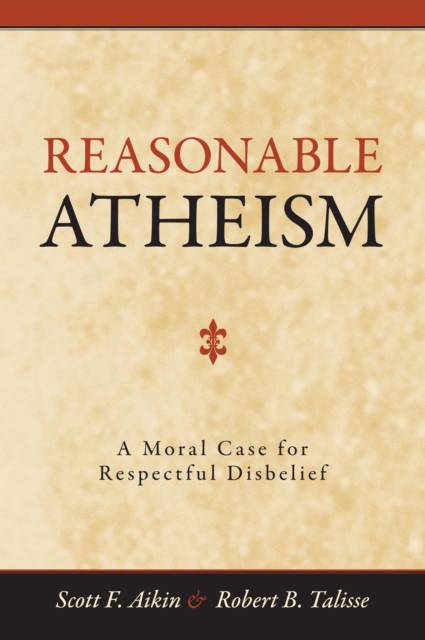
- Afhalen na 1 uur in een winkel met voorraad
- Gratis thuislevering in België vanaf € 30
- Ruim aanbod met 7 miljoen producten
- Afhalen na 1 uur in een winkel met voorraad
- Gratis thuislevering in België vanaf € 30
- Ruim aanbod met 7 miljoen producten
Zoeken
Reasonable Atheism
A Moral Case For Respectful Disbelief
Scott F Aikin, Robert B Talisse
Paperback | Engels
€ 22,45
+ 44 punten
Omschrijving
A recent poll from the University of Minnesota finds that atheists are America's least trusted social group. Perhaps compounding this negative impression is the attack-dog persona taken on in the past decade by the "New Atheists." Not only have they been quite public about their disbelief, but they've also stridently lambasted religious belief generally in a number of bestselling books. Disturbed by this negative public perception and the deterioration in the tone of open debate, the authors of this eminently reasonable work attempt to introduce a note of civility and rational clarity. To both religious believers and fellow atheists they counsel a measured approach that combines serious intellectual engagement with respect for the reasonableness of the other side's position. The heart of the book is the authors' moral case for atheism. Atheism, they contend, manifests a decidedly moral concern for others and their wellbeing. The authors further argue that atheism is driven by the kinds of moral considerations that should be familiar to all religious believers. Atheists are motivated by a moral concern for others, a desire to alleviate suffering and combat evil, and an appreciation for the value of life, freedom, and responsibility. In the end, the authors make not only a compelling case for atheism but also for the value and necessity of mutual respect in a democratic society composed of diverse citizens.
Specificaties
Betrokkenen
- Auteur(s):
- Uitgeverij:
Inhoud
- Aantal bladzijden:
- 219
- Taal:
- Engels
Eigenschappen
- Productcode (EAN):
- 9781616143831
- Verschijningsdatum:
- 26/04/2011
- Uitvoering:
- Paperback
- Formaat:
- Trade paperback (VS)
- Afmetingen:
- 152 mm x 227 mm
- Gewicht:
- 249 g

Alleen bij Standaard Boekhandel
+ 44 punten op je klantenkaart van Standaard Boekhandel
Beoordelingen
We publiceren alleen reviews die voldoen aan de voorwaarden voor reviews. Bekijk onze voorwaarden voor reviews.








